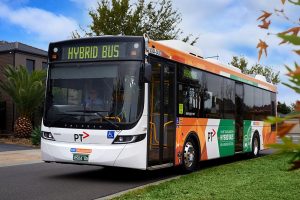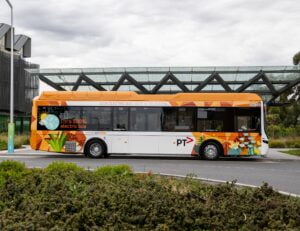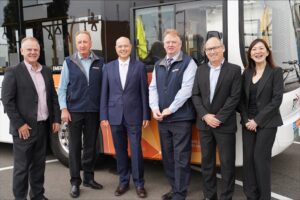CDC is committed to delivering transport innovation that reduces the emissions and the fuel consumption of our fleet. We strive to reduce the carbon footprint of each and every journey across our network.
We make ongoing investments in new vehicles to reduce our emissions and we support ongoing research into alternate fuels and green technology.
CDC is at the forefront of the transition to environmentally conscious public transport. Today, we operate one of Australia’s largest hybrid bus fleet, with a total of 50 buses in Melbourne. CDC is also increasing the number of battery electric buses and gearing up to trial hydrogen powered buses in 2025.
In shaping a better future we’re committed to the roll-out of cleaner, quieter and less polluting vehicles.

Hybrid Buses
Compared to conventional diesel buses, hybrid buses consume up to 30% less fuel and produce 30% less emissions. The hybrid ride is also quieter and smoother.
CDC has one of the largest eco-friendly bus fleets in Australia with 50 hybrid buses, which make up 17% of our Metro contracted buses in Melbourne and service Melbourne’s metropolitan routes, demonstrating our strong focus on sustainability and innovation. From 2019 – 2023, almost 4,000 tonnes of c02 have been saved by introducing hybrid buses to these routes, equivalent to 867 cars being taken off the road since 2019.
The bonus when transitioning our bus fleet from gas and diesel to hybrids is that it can be done immediately without the need for additional infrastructure. The local automotive industry also wins with all body manufacture and fit outs for our hybrid buses completed domestically.
Volvo’s Zone Management, powered by geofencing technology and telematics, fitted on CDC’s hybrid buses revolutionises and optimises the hybrid buses to operate exclusively in electric drive mode and achieve zero emissions within designated zone. This not only contributes to a greener, more sustainable network, but also improves customer experience.

Electric Buses
Electric buses have less vibration, less noise and zero emissions. A win for the environment. A win for public health.
CDC has commenced a Zero Emissions Bus Trial in Melbourne’s south-eastern suburbs, in partnership with the Victorian Department of Transport and bus industry leaders.
We now have eight battery-electric buses operating on route 601 on weekdays and route 630 on weekends, covering Huntingdale Station, Monash University, Gardenvale and Ormond Stations.
To provide a successful and reliable electrification of these services, Australia’s first offsite bus charging station is operating at Monash University interchange. This is complemented by the charging stations at CDC’s Oakleigh depot.
The trial will also be the first use of the Volvo-Volgren battery-electric buses in the eastern states following their successful rollout in Western Australia.
In regional NSW, CDC is currently operating four battery electric buses in Queanbeyan and Narrabri as part of Transport for NSW’s ZEB trial across the region.
Three new Zero Emission Buses (ZEBs) are also operating on school bus runs around Queanbeyan for an 18 month trial period.
This is part of Transport for NSW’s $25 million project to run a series of trials of zero emission buses and coaches across regional NSW. Students from 15 schools in NSW and the ACT will enjoy a quieter, smoother, and more comfortable journey on buses that emit no harmful exhaust fumes.
A new battery electric bus will be also trialled at Narrabri, operating school bus runs where students will be able to take a ride on the bus.
Internationally, our parent company ComfortDelGro operates over 160 electric buses in the United Kingdom and over 30 electric buses in Singapore.

Hydrogen Buses
CDC is taking significant steps in its quest for greener bus journeys and cleaner air in a partnership with Australian sustainable energy and vehicle suppliers that will see it operating two hydrogen powered fuel cell electric buses in Geelong in 2025.
The Viva Energy Hub in Geelong, of which CDC is a foundation partner, is a multi-million dollar hydrogen mobility development led by Viva Energy. Together, the partners have worked with the Federal Government via the Australian Renewable Energy Agency (ARENA) and the Victorian State Government via the Department of Environment, Land, Water and Planning (DELWP) to launch what promises to be Australia’s most ambitious green hydrogen mobility project.
Our sister company, Metroline in UK has operated 20 hydrogen buses in the UK since 2021, the first of their kind in England.
